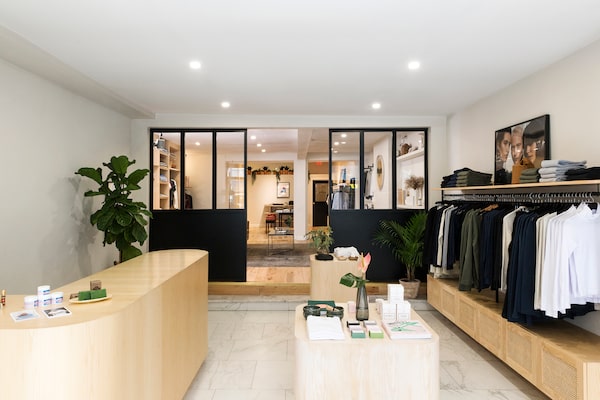
Toronto-based cotton apparel line Kotn ranked in the top 10 per cent of B Corp companies worldwide in terms of community involvement.Adam Moco/Handout
Two years ago, Ben Sehl, co-founder of the Toronto-based cotton apparel line Kotn, became suspicious of the number of players in the fashion industry claiming to be ethical and sustainable.
“Green-washing” or “social-washing,” when companies make misleading claims about the environmental/community benefits of their products, is common, and Sehl and his two partners, Rami Helali and Mackenzie Yeates, didn’t want Kotn to be lumped into that dubious mix.
Their solution to set the record straight? Apply for B Corp certification, a little-known stamp of approval that, at its most basic level, means a company has proven its commitment to do good. In other words, they’ve jumped through hoops to meet rigorous social and environmental standards that set them apart from companies that only talk the talk.
“We wanted to set the bar higher for ourselves,” says Sehl, whose four-year-old company buys Egyptian cotton from 690 small farming families in the Nile Delta region, an impoverished area where more than 70 per cent of residents are illiterate. “In our industry, where fast fashion is a huge environmental concern, B Corp [status] was a great way for us to say, ‘This is a line in the sand.’ This is a code of conduct we abide by at a bare minimum.”

Kotn buys Egyptian cotton from 690 small farming families in the Nile Delta region, an impoverished area.Nour El Refai/Handout
Kotn received its B Corp badge two years ago, and has since built two schools in the region and has another two opening later this year. “B Corp is all about holding companies accountable. It’s a promise to our employees, stakeholders, customers and community that we won’t just say we’re going to give back – we’ll actually do it.”
It’s not easy to achieve B Corp certification, launched more than a decade ago by a non-profit organization called B Lab, based in Wayne, Pa. Candidates have to pass a system called B Impact Assessment, which measures how well workers are paid and treated, how businesses impact the climate and if B Corps are accountable to stakeholders, not just shareholders. Applicants’ answers are then graded, with a minimum score of 80 needed for certification. A perfect score is 200 – and it’s not easy to get.
To date, there are more than 3,000 B Corp-designated companies across 160 industries in 60 countries. Its logo is on everything from ice cream (Ben & Jerry’s) to cosmetics (Beautycounter); shoes (Allbirds) to a slew of fashion brands, such as Eileen Fisher, Patagonia, Cotopaxi and Athleta.
In Canada, there are 255 B Corp brands, representing an equally diverse cross-section of businesses, including swimwear (Loka), breweries (Beau’s), organic food delivery (Spud.ca in British Columbia and Alberta), housewares (Goodee), wine (Summerhill Pyramid Winery in Kelowna) and casual wear (Tentree of Regina, which plants 10 trees for every item purchased).

Kotn received its B Corp badge two years ago, and has since built two schools in the Nile Delta region.Nour El Refai/Handout
Husein Rahemtulla, co-founder of meal-kit company Fresh Prep in Vancouver, can attest that getting B Corp status is no easy matter. He and his team spent almost a year compiling all the information needed to answer more than 300 questions on everything from fair wages and benefits, environmental impact, community engagement and corporate governance. “It’s rigorous,” he says. “But it should be. Our industry needs to be held accountable for how wasteful it is in terms of packaging.”
Fresh Prep received its B Badge in March and aims to be one of the first meal-kit delivery companies to be zero-waste. “B Corp is a benchmark to measure yourself,” Rahemtulla says. “It highlights where you’ve done well, and where you need to improve. But most important, it shows our customers we’re not just using their money to pay dividends or increase shareholder value. We’re using it to help solve complex social issues.”
Toronto retail consultant Bruce Winders says the B Corp designation has taken time to catch on. However, in the past two years, he’s seen an uptick in the number of companies that proudly bear the insignia.

Kotn store at 754 Queen St. W, Toronto. The company passed the B Corp certification with a score of 95.5, while the average score of businesses that apply is 50.9.Adam Moco
“It has been under a lot of people’s radars, but with reports coming out on an almost daily basis of the harm we’re doing to our planet, more companies, big and small, are becoming more interested,” he says. “Morally, it’s the right thing to do, and from a business perspective it’s the right thing to do. A growing number of consumers, especially millennials and Gen Z, want companies that are sticking their necks out and being more socially responsible. B Corp is a way to formalize that, to some degree.”
At Kotn, Sehl says it took them more than six months to gather all the information required for the certification and a few agonizing months more to find out if they qualified. They passed with a score of 95.5 (the average score of businesses that apply is 50.9). They also ranked in the top 10 per cent of B Corp companies worldwide in terms of community involvement.
“We don’t want to hide behind anything,” says Sehl, whose company just launched a “traceability” link on its website so customers can follow its supply chain from A to Z. “Our customers … should be able to know where a product came from, who made it, how and when. That shouldn’t be a luxury, but a standard.”
Live with style. We have a weekly Style newsletter on fashion and design trends, plus shopping tips and inspiration. Sign up today.
 Gayle MacDonald
Gayle MacDonald